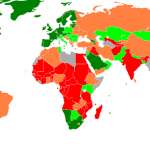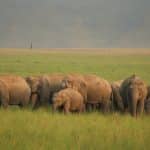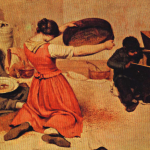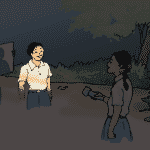Class-6 Science Notes- Chapters 1&2
Chapter 1- Summary
- There is a lot of variation in the food eaten in different regions of India.
- The main sources of our food are plants and animals.
- Animals which eat only plants are called herbivores.
- Animals which eat only animals are called carnivores.
- Animals which eat both plants and animals are called omnivores.
Chapter 2- Summary
- Each dish is usually made up of one or more ingredients, which we get from plants or animals.
- These ingredients contain some components that are needed by our body. These components are called nutrients.
- The major nutrients in our food are carbohydrates, proteins, fats, vitamins and minerals.
- In addition, food contains dietary fibres and water which are also needed by our body.
- There are many types of carbohydrates. The main carbohydrates found in our food are in the form of starch and sugars.
- Test for starch: If we put a few drops of dilute iodine solution on a food item, then a change in colour of the food item to blue-black indicates the presence of starch in it.
- Test for protein: food item + 10 drops of water + 2 drops of copper sulphate solution + 10 drops of solution of caustic soda(sodium hydroxide). A violet colour indicates the presence of proteins in the food item.
- Test for fats: An oily patch on paper, after rubbing the food item on it, confirms the presence of fats in the food item.
What do various nutrients do for our body?
- Carbohydrates mainly provide energy to our body.
- Fats also give us energy. In fact, fats give much more energy as compared to the same amount of carbohydrates.
- Foods containing proteins are often called ‘body-building foods’.
- Vitamins help in protecting our body against diseases. They also help in keeping our eyes, bones, teeth and gums healthy.
- Vitamin-A: for skin and eyes.
- Vitamin-C: helps in fighting against diseases. It gets easily destroyed by heat during cooking.
- Vitamin-D: helps our body to use calcium for bones and teeth.
- Minerals are needed by our body in small amounts.
- Each one is essential for proper growth of body and to maintain good health. Example: Iodine, Phosphorous, Iron and Calcium.
- Our body also needs dietary fibres and water.
- Dietary fibres are also known as roughage. They are mainly provided by plant products in our foods. Whole grains, pulses, potatoes, fresh fruits and vegetables are main sources.
- Roughage does not have any nutritional value. It helps our body get rid of undigested food.
- Water helps our body to absorb nutrients from food.
- It also helps in throwing out some wastes from body as urine and sweat.
Balanced Diet
- For growth and good health, our diet should have all the nutrients that our body needs, in right quantities. It should also contain a good amount of roughage and water. Such a diet is called a balanced diet.
- Many useful proteins and considerable amount of minerals are lost if excess water is used during cooking and then thrown away.
Deficiency Diseases
- A person may be getting enough food to eat, but sometimes the food may not contain a particular nutrient. If this continues over a long period of time, the person may suffer from its deficiency.
- Diseases that occur due to lack of nutrients over a long period are called deficiency diseases. They can be prevented by taking a balanced diet.
- Lack of proteins: stunted growth, swelling of face, discoloration of hair, skin diseases and diarrhoea.
- Lack of carbohydrates & proteins: growth may stop completely.












